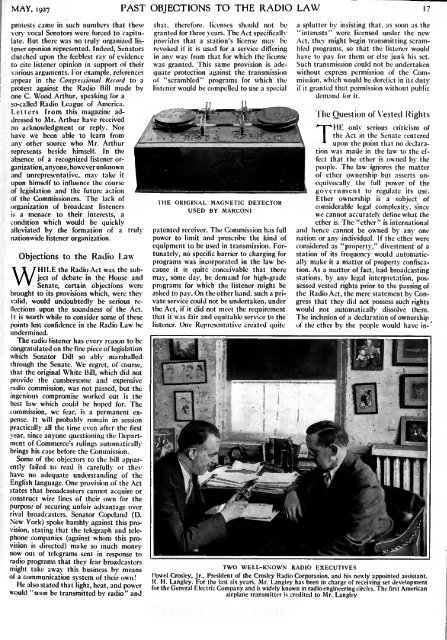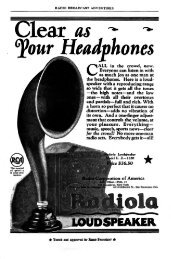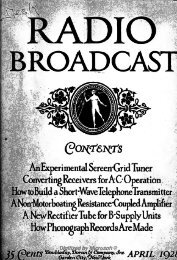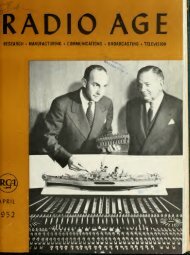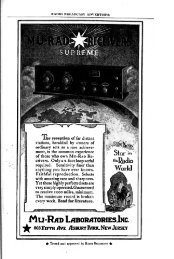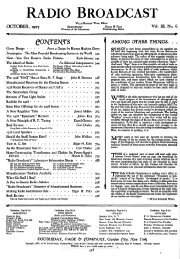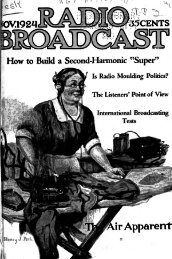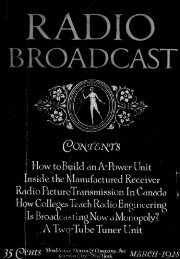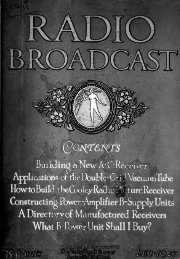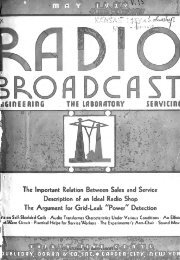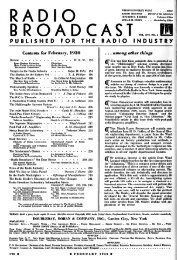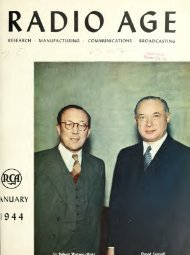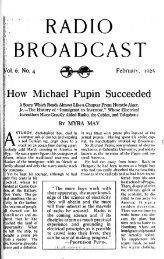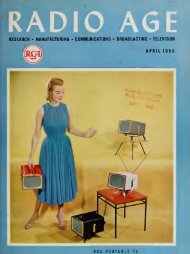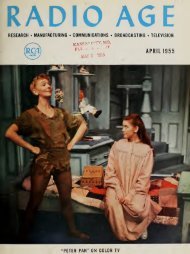Radio Broadcast - 1927, May - 61 Pages, 4.9 MB ... - VacuumTubeEra
Radio Broadcast - 1927, May - 61 Pages, 4.9 MB ... - VacuumTubeEra
Radio Broadcast - 1927, May - 61 Pages, 4.9 MB ... - VacuumTubeEra
Create successful ePaper yourself
Turn your PDF publications into a flip-book with our unique Google optimized e-Paper software.
MAY, <strong>1927</strong>PAST OBJECTIONS TO THE RADIO LAWprotests came in such numbers that thesevery vocal Senators were forced to capitulate.But there was no truly organized listeneropinion represented. Indeed, Senatorsclutched upon the feeblest ray of evidenceto cite listener opinion in support of theirvarious arguments. For example, referencesappear in the Congressional Record to aprotest against the <strong>Radio</strong> Bill made byone C. Wood Arthur, speaking for aso-called <strong>Radio</strong> League of America.Letters from this magazine addressedto Mr. Arthur have receivedno acknowledgment or reply. Norhave we been able to learn fromany other source who Mr. Arthurrepresents beside himself. In theabsence of a recognized listener organization,anyone, however unknownand unrepresentative, may take itupon himself to influence the courseof legislation and the future actionof the Commissioners. The lack oforganizationof broadcast listenersis a menace to their interests, acondition which would be quicklyalleviated by the formation of a trulynationwide listener organization.Objectionsthe <strong>Radio</strong> Act was the sub-of debate in the House andSenate, certain objections werejectWHILEto the <strong>Radio</strong> Lawbrought to its provisions which, were theyvalid, would undoubtedly be serious reflectionsupon the soundness of the Act.It is worth while to consider some of thesepoints lest confidence in the <strong>Radio</strong> Law beundermined.The radio listener has every reason to becongratulated on the fine piece of legislationwhich Senator Dill so ably marshalledthrough the Senate. We regret, of course,that the original White Bill, which did notprovide the cumbersome and expensiveradio commission, was not passed, but theingenious compromise worked out is thebest law which could be hoped for. Thecommission, we fear, is a permanent expense.It will probably remain in sessionpractically all the time even after the firstyear, since anyone questioning the Departmentof Commerce's rulings automaticallybrings his case before the Commission.Some of the objectors to the billapparentlyfailed to read it carefully or theyhave no adequate understanding of theEnglish language. One provision of the Actstates that broadcasters cannot acquire orconstruct wire lines of their own for thepurpose of securing unfair advantage overrival broadcasters. Senator Copeland (D.New York) spoke harshly against this provision,stating that the telegraph and telephonecompanies (against whom this provisionis directed) make so much moneynow out of telegrams sent in response toradio programs that they fear broadcastersmight take away this business by meansof a communication system of their own!He also stated that light, heat, and powerwould "soon be transmitted bv radio" andthat, therefore, licenses should not be a splutter by insisting that, as soon as thegranted for three years. The Act specifically "interests" were licensed under the newprovides that a station's license may be Act, they might begin transmitting scrambledprograms, so that the listener wouldrevoked if it is used for a service differingin any way from that for which the license have to pay for them or else junk his set.was granted. This same provisionis adequateprotection against the transmission without express permission of the Com-Such transmission could not be undertakenof "scrambled" programs for which the mission, which would be derelict in itsdutylistener would be compelled to use a special if itgranted that permission without publicdemand for it.I he Question of Vested RightsHE only serious criticism ofthe Act in the Senate centeredT:upon the point that no declarationwas made in the law to the effectthat the ether is owned by thepeople. The law ignores the matterof ether ownership but asserts unequivocallythe full power of thegovernment to regulate its use.EtherTHE ORIGINAL MAGNETIC DETECTORownershipis a subject ofconsiderableUSED BY MARCONIlegal complexity, sincewe cannot accurately define what theether is. The "ether" is internationalpatented receiver. The Commission has full and hence cannot be owned by any onepower to limit and prescribe the kind of nation or any individual. If the ether wereequipment to be used in transmission. Fortunately,no specific barrier to charging for station of itsconsidered as "property," divestment of afrequency would automaticallymake it a matter of property confisca-programs was incorporated in the law becauseit isquite conceivable that there tion. As a matter of fact, had broadcastingmay, some day, be demand for high-grade stations, by any legal interpretation, possessedvested rights prior to the passing ofprograms for which the listener might beasked to pay. On the other hand, such a privateservice could not be undertaken, under gress that they did not possess such rightsthe <strong>Radio</strong> Act, the mere statement by Con-the Act, if it did not meet the requirement would not automatically dissolve them.that it was fair and equitable service to the The inclusion of a declaration of ownershiplistener. One Representative created quite of the ether by the"people would have in-TWO WELL-KNOWN RADIO EXECUTIVESPowel Crosley, jr., President of the Crosley <strong>Radio</strong> Corporation, and his newly appointed assistant,R. H. Langley. For the last six years, Mr. Langley has been in charge of receiving set developmentfor the General Electric Company and iswidely known in radio engineering circles. The first Americanairplane transmitter is credited to Mr. Langley


